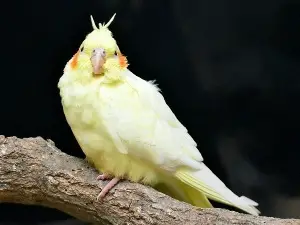
Cockatiels are quite friendly birds but because these companion birds come from wild birds they will still have some aggressive traits like biting.
This article is a look into whether cockatiel bites can be dangerous
Table of Contents
Are cockatiel bites dangerous?
Birds may be small but this doesn’t mean that they’re pushovers, they can bite you from time to time if they feel the need to. Here is what you need to know about cockatiel bites:
Injuries:
The strength and force of a bird’s bite will be determined by the size of the bird and the size of the bird’s beak.
Large parrots like cockatoos, macaws, and amazons are quite big and their bites are strong, but, because a cockatiel is a medium-sized parrot these birds don’t have bites that are as strong.
However, even though the bites of these birds aren’t the strongest it doesn’t mean that they can’t injure you.
Cockatiels have beaks that are designed to be able to crush seeds or berries so their bites do carry some force.
These birds still have strong enough bites to where they can break your skin if enough force is used during the bite.
Not only this, if the bird is biting you then it is likely also scratching you. These birds have claws that can scratch and break your skin as well as draw blood.
Thankfully, these birds will not bite hard enough to where they can bite your finger off, the bird is simply not strong enough to do this.
That being said, the bite may still hurt a little, the pain will be similar to a paper cut.
Infection:
A bird may be sick or carry bacteria, but the bird may not present signs of being ill or carrying any bacteria.
It is common for birds to carry the bacteria that are already present in our environment, bacteria like salmonella, E.coli, and staphylococcus but they can also carry and transfer pasturella, multocida, lactobacillus and proteus through their bites and scratches.
If your bird transfers any of the above bacteria to you through its bite then an infection may develop.
Thankfully, you don’t have to worry about catching rabies from your birds as domestic birds do not carry rabies.
What to do if you’re bitten:
The bite may pierce your skin but it may not dig deep enough to cause a major wound. However, if you are bitten by your bird then thoroughly cleaning the area and keeping a close eye on it is advised.
There is always a small risk of a bird bite or scratch spreading a bacterial illness to you, so, if you see a reaction developing on your skin after the bite then you may want to seek medical attention.
If the bird bites people often then training the bird not to bite you is a good next step to take.
Do not scold your bird if it bites you, this will make it anxious about you and the bird will see you or your wagging finger as a threat.
Also, avoid putting your finger in the bird’s cage especially if you can tell that the bird is agitated in any way.
If you enjoyed this article then you may also be interested in other bird related articles. Here are some articles that you may be interested in: What Do Cockatiels Like To Do For Fun?, What Are Cockatiels Allergic To?, Cockatiel Mating With Hand, How To Clean A Baby Cockatiel, How To Clean Baby Cockatiel Feathers, Cockatiel Crying, Baby Cockatiel Crying

